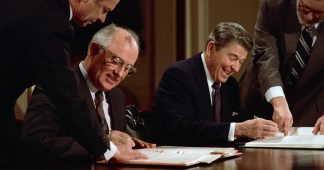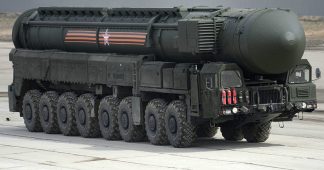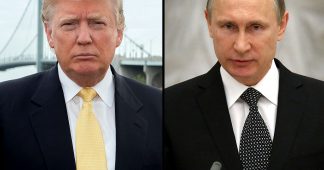By Alex Lantier
22 October 2018
Speaking at a campaign rally in Nevada on Saturday, President Donald Trump said Washington will repudiate the 1987 Intermediate-Range Nuclear Forces (INF) treaty and develop intermediate range nuclear missiles. “We’ll have to develop those weapons,” he said. “We’re going to terminate the agreement and we’re going to pull out.”
With this decision, Washington is scrapping the entire nuclear arms control framework that emerged from the Cold War. In 2001, Washington repudiated the 1972 Anti-Ballistic Missile (ABM) treaty, so it could begin working on a “Star Wars” anti-ballistic missile system to shoot down enemy ballistic missiles. Now it is scrapping the 1987 treaty that bans US or Russian manufacture and deployment of nuclear missiles with ranges of 500-5,500 kilometers (310-3,420 miles). For the first time since 1972, there is to be no treaty limiting the major powers’ deployment of nuclear arms.
Washington is aggressively stoking a nuclear arms race, with Russia and China first in its gun-sights, which would provoke stepped-up missile deployments across Europe and East Asia. It points to the immediate and growing risk of nuclear war between the major powers.
Trump blamed his decision to scrap the INF treaty on Moscow and Beijing: “Russia has violated the agreement. They’ve been violating it for many years and I don’t know why President Obama didn’t negotiate or pull out. … Unless Russia comes to us and China comes to us and they all come to us and they say, ‘Let’s all of us get smart and let’s none of us develop those weapons,’ but if Russia’s doing it and if China’s doing it and we’re adhering to the agreement, that’s unacceptable. So we have a tremendous amount of money to play with with our military.”
Moscow condemned Trump’s statement as “blackmail” against Russia. Deputy Foreign Minister Sergey Ryabkov told TASS: “At first glance, I can say that apparently the INF Treaty creates problems for pursuing the line towards the US total domination in military sphere…This would be a very dangerous step, which, I’m sure, won’t be just understood by the international community, but arouse serious condemnation of all members of the world community.”
Ryabkov said he would discuss it with US National Security Advisor John Bolton, who supports killing the INF treaty. Bolton arrived yesterday in Moscow for two days of talks starting today.
Trump’s attempt to blame Moscow and Beijing for his decision is a transparent political fraud. The US repudiation of nuclear arms control treaties is part of a longstanding, aggressive foreign policy aiming to exploit US military supremacy in the aftermath of the Stalinist dissolution of the Soviet Union to counterbalance the effects of its accelerating economic decline in world affairs. The 2001 repudiation of the ABM treaty was part of the Bush administration’s turn to war, including the illegal invasions and occupations of Afghanistan in 2001 and Iraq in 2003, to dominate the Eurasian landmass.
The Democratic Party escalated this policy, launching wars in Libya and Syria while initiating a “pivot to Asia” to confront China in Barack Obama’s first term. In his second term, together with its European allies, Obama backed a far-right coup in Ukraine that toppled a pro-Russian government and provoked an all-out military confrontation with Russia in Eastern Europe. Washington and its European allies have deployed tens of thousands of troops on the very borders of Russia.
The coup in Ukraine and the resulting escalation by Washington and the European imperialist powers in Eastern Europe set the world on course towards nuclear war. Amid the NATO military build-up against Russia, Washington first alleged in July 2014 that Moscow was developing a ground-launched cruise missile system violating the INF treaty. Recently, on October 2, US Ambassador Kay Bailey Hutchison took the extraordinary step of threatening to bomb Russia to “take out” these missiles, after again denouncing Russia for violating the INF treaty.
It is not Russian but US aggression that is driving Washington’s decision to scrap the INF treaty. In fact, powerful factions of the US military and foreign policy establishment have been campaigning for years to scrap the INF treaty—not because of Russia, but to threaten China.
After Obama launched the “pivot to Asia” in 2011, Beijing sought to develop intermediate-range missiles capable of hitting US aircraft carriers and military bases in the Western Pacific, to deter Washington from using them to attack China. As the balance of power in that region shifted ever more in China’s favor, voices in US ruling elite began to call for scrapping the INF treaty, using tensions with Russia as a cover for a policy designed to target China.
In 2014, the National Interest published an article, “China’s Missile Forces Are Growing: Is It Time to Modify the INF Treaty?” It wrote that “forward-based missile forces could be a partial solution to emerging operational problems in the Western Pacific.” However, the INF treaty bans Washington and Moscow from having the type of missiles the Pentagon would deploy to the Western Pacific to target China. So, it added, “How might Washington leverage current tensions with Moscow to improve its long-term military posture vis-à-vis Beijing? One option is to abrogate INF.”
Admiral Harry Harris, who recently stepped down as commander of the US Pacific Fleet to become the US Ambassador to South Korea, became an aggressive proponent of renegotiating or scrapping the INF treaty. Last year, Harris said that he considered arms control “problematic,” as the INF treaty limits “our ability to counter Chinese and other countries’ cruise missiles, land-based missiles.”
Testifying to the US Senate this March, Harris made clear that scrapping the INF treaty was critical to trying to re-establish full US military dominance of the Pacific Ocean. “We are at a disadvantage with regard to China today in the sense that China has ground-based ballistic missiles that threaten our basing in the western Pacific and our ships,” he said. “We have no ground-based capability that can threaten China because of, among other things, our rigid adherence … to the INF treaty.”
Washington’s repudiation of nuclear arms control as it seeks to maintain global military dominance is a warning to the working class in America and worldwide.
With the major powers pledged to spend massive sums on their arsenals of missiles and nuclear warheads, led by Washington, who pledged in 2014 to spend $1 trillion to modernize its nuclear arms, untold social resources are being squandered on creating conditions for a nuclear war. Governments internationally are determined that the costs of this insane policy are to be borne by workers, through austerity and attacks on living standards.
The construction of an anti-war movement based in the working class is a critical necessity, objectively posed by the rapid development of the danger of wars that could end in a nuclear conflagration.











